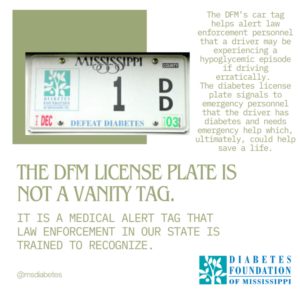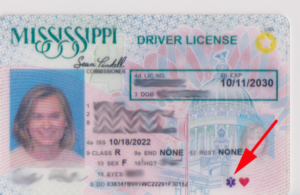The Diabetes Foundation of Mississippi is here to help make the transition from diagnosis of diabetes to part of daily life as smooth as possible. We are here to help educate schools, daycares, and work places to become more aware of the needs of those with diabetes. Through our advocacy, we have been able to help make the change to a new normal much easier.
Special License Plates and Drivers Licenses
 Help is here for Mississippians with diabetes!
Help is here for Mississippians with diabetes!
Thanks to a joint effort of the Mississippi Legislature, the State Tax Commission and the Diabetes Foundation of Mississippi, our license plate was launched in August of 2002 for people with diabetes. The DFM’s car tag helps alert law enforcement personnel when a driver may be experiencing a hypoglycemic episode and, consequently, driving erratically. The diabetes license plate signals to emergency personnel that the driver has diabetes, which, ultimately, could help save a life.
The license plate is available only to Mississippi drivers with diabetes. The plate has the DFM’s logo on it and says “Defeat Diabetes.”
There is no additional charge beyond your regular registration, taxes, and fees for the license plates if the car title is in the name of the driver who has diabetes. However, if the title is in someone else’s name, but the person with diabetes is the primary driver of the car, there is a charge of $38.00 for a diabetes license plate. Car tag prices may vary depending on the county.
 The Mississippi driver’s license for drivers with diabetes has a purple star on the bottom of the license, indicating that the driver has diabetes. There is also a space on the license to list whether the individual is insulin dependent or takes oral medications.
The Mississippi driver’s license for drivers with diabetes has a purple star on the bottom of the license, indicating that the driver has diabetes. There is also a space on the license to list whether the individual is insulin dependent or takes oral medications.
Forms:
Fillable Diabetes Tag Application to save to your computer
Download a copy of the Diabetes Tag and Driver’s License letter
Lifesaver Campaign for Law Enforcement
 The Diabetes Foundation of Mississippi provides a free in-service program to all law enforcement officials statewide. Law enforcement officials receive training on how to recognize diabetic emergencies and how to respond to the driver’s actions. In addition, law enforcement personnel are educated on hypoglycemia.
The Diabetes Foundation of Mississippi provides a free in-service program to all law enforcement officials statewide. Law enforcement officials receive training on how to recognize diabetic emergencies and how to respond to the driver’s actions. In addition, law enforcement personnel are educated on hypoglycemia.
The program also aims to inform the law enforcement personnel about medic-alert identification, diabetes license plates and special coded driver’s licenses, as well as different diabetes medications and supplies and the symptoms of hyperglycemic and hypoglycemic episodes.
Is it drinking, drugs, or diabetes? Low blood sugar (hypoglycemia) symptoms often mimic impairment caused by alcohol or drugs because the brain is not receiving the fuel it needs to operate properly. There are cases where individuals have been incarcerated for “drunk driving” when they should have been hospitalized.
To avoid a tragic error, check for:
- Diabetes car tag and/or driver’s license
- Medical alert card or bracelet
- Glucose tabs or gel
- Blood Glucose Meter
- Driver wearing Insulin Pump
Warning signs of low blood sugar:
- Dizziness
- Hunger
- Weakness or fatigue
- Blurred vision
- Shaking
- Uncooperative behaviors
- Rapid heartbeat
- Headache
- Irritability or anxiety
- Sweating
- Inability to waken
Give patients glucose gel and transport to nearest emergency room. Half a can of regular soda can be given if no gel is available and if patient is able to swallow.
The Diabetes Foundation of Mississippi works with families of children with diabetes, schools and daycare programs around Mississippi to ensure that everyone understands basic diabetes management and emergency treatment of low or high blood glucose. Our “Sweet Subject School Diabetes Education Program” has trained hundreds of school and daycare staff about managing diabetes when the child or teen is away from home. Several federal laws, including the Americans with Disabilities Act (ADA) and the Individuals with Disabilities Education Act (IDEA) protect students with diabetes while at school or daycare.
The 504 plan is an agreement worked out with the student, parents/guardians, teachers and other school personnel, and if needed, the district administration, to make sure that everyone involved knows their roles and responsibilities in assuring the safety and education of the student. All public and private schools and daycare receiving federal funds are covered by this law.
The American Disabilities Act (ADA) also covers the student with diabetes. The ADA covers all public schools and all private schools except those run by religious institutions. (If the religious institution receives federal funds, it is also covered).
- Relevant materials from Helping the Student with Diabetes Succeed
- Sample 504 plans for children and teens of various ages, using multiple daily injections or insulin pumps, can be found on the Children with Diabetes website.
- Information on Section 504 from the Office for Civil Rights
Diabetic Alert Dogs can go to School!
 With the support of the Diabetes Foundation, House Bill 1405 passed in the legislature regarding Diabetic Alert Dogs in the school system, signed by Governor Bryant.
With the support of the Diabetes Foundation, House Bill 1405 passed in the legislature regarding Diabetic Alert Dogs in the school system, signed by Governor Bryant.
“Diabetic service dogs are just another fail safe in case technology doesn’t do its job. Then you have nature to back it up. Any potential safety net that you can provide for a child is well worth it” Dr. John Mayfield III.
For some people, dogs are merely pets – someone to play fetch and go on walks with. For others, their dogs are their best friends – someone to confide in and snuggle close to at night. For some, their dog is their protector and life-saver. He is their hero.
What makes a diabetes alert dog?
A dog’s scent detection capacity is 10 to 50+ times stronger than a human’s. Certain types of dogs are able to do more with their superior sense of smell than others. Scenting breeds take full advantage of their amazing capability to ‘taste’ smells, and the Diabetes Alert Dogs can categorize scents and associate smells with specific human responses.
 It’s because of their amazing scenting abilities that a DAD can detect a change in blood sugar levels in humans. We train them to not only recognize the change, but to react by alerting their humans by barking, nudging them, or bringing them a special item. The reaction, in real time, helps us know when a change is actively happening. To a person with diabetes, that real-time alert can be crucial.
It’s because of their amazing scenting abilities that a DAD can detect a change in blood sugar levels in humans. We train them to not only recognize the change, but to react by alerting their humans by barking, nudging them, or bringing them a special item. The reaction, in real time, helps us know when a change is actively happening. To a person with diabetes, that real-time alert can be crucial.
Many breeds are bred specifically for their sense of smell. While hunting dogs certainly qualify for the job, they aren’t the only breed that does it amazingly well. The best candidate for a DAD is one that scents well, has an above average work ethic and is able to manage their work drive to be calm enough to live within the parameters of a family setting.
Certain breeds fit all of those requirements easily, but all the individuals in a breed will not make a good diabetes alert dog. Variations of personality, temperaments, and drive even within a litter can be extreme. So while a breeder has a whole litter of pups, only 1, 2 or none may qualify for the demands of being a Diabetes Alert Dog.
For those living with diabetes, maintaining proper glucose levels can be challenging. Exercise, food, infections and stress are instrumental factors that will stimulate high (hyperglycemic) or low (hypoglycemic) blood sugars. Individual with diabetes must learn to maintain a healthy balance between these factors to prevent life-threatening consequences. Many people struggling to maintain healthy glucose levels choose to purchase diabetic alert dogs (DAD).
